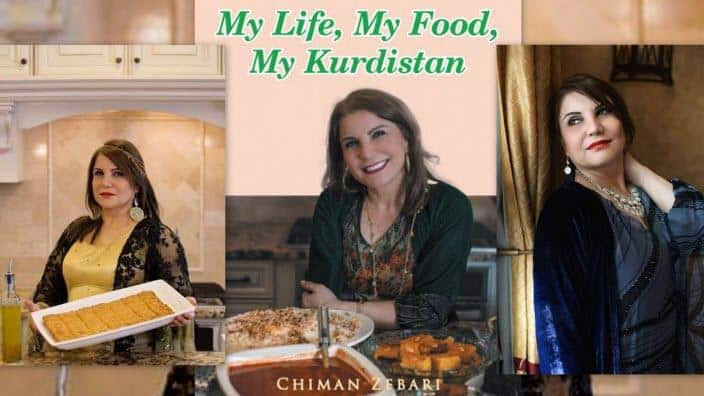Chiman Zebari’s 'My Life, My Food, My Kurdistan', is more than just a cookbook. Zebari also uses it to tell her story of displacement and war of her childhood as a Kurd.
Chiman Zebari became a refugee in Iran, together with her family at a very young age in the mid-1970s, fleeing the Iraqi Regime, before settling in the United States. There Zebari was able to rebuild her life, and focus on her passion for cooking among her other career achievements.
Once a burden, Zebari tells SBS Kurdish how cooking became “therapeutic…and cathartic."
The collection of recipes in her cookbook, as she puts it, "is a combination of traditional [Kurdish cuisine] and altered dishes."
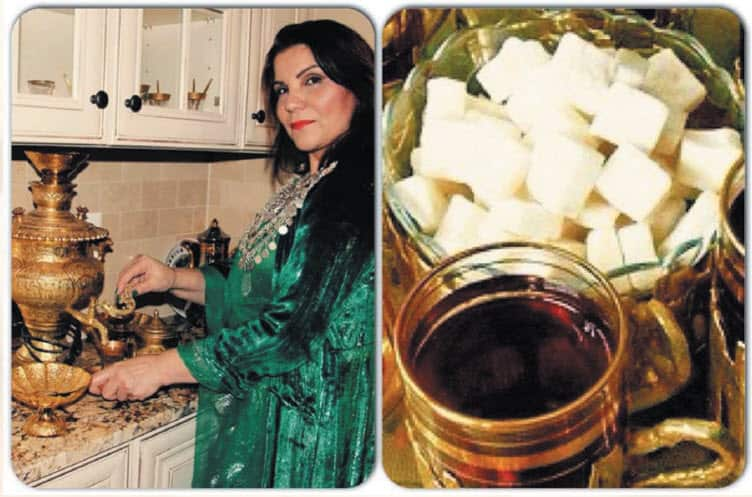
Chimen Zebari preparing Kurdish tea (çay) which is a very popular drink among Kurds
Kurdish cuisine has all the characteristics of neighbouring middle-eastern cuisines, with some unique dishes and flavours.
Like all world cuisines, geography has its influence on Kurdish food. Most Kurdish dishes are slow-cooked. A Kurdish breakfast however, mostly consists of fresh produce, like dairy (cheeses and yogurt), flat bread called Nan, fried or boiled eggs, sometimes served with fresh salad and olives.
Nan traditionally baked with wood fire in mud ovens (tendur) or on curved metal discs that sit on fire pits (Saj).
Most Kurdish meals contain slow cooked meat and vegetables and/or herbs that are served with rice. Side dishes can be seasonal; such as mix pickles which are usually served in winter, and fresh salads or mixed fresh herbs.
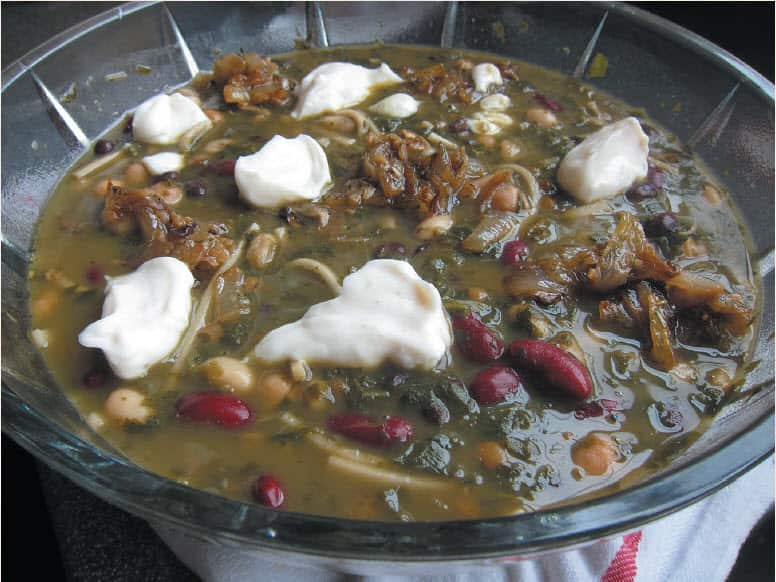
Aşî-Rişte- a noodle beans and herbs pottage-served with yogurt on top then mixed
Traditionally, some dishes would have different versions in different seasons. For examples, Dolma; stuffed vegetable and rolled vine leaves dish, is made with all green and fresh ingredients in spring, however in winter preserved or dried vegetables and leaves would be used.
A Kurdish dish that is mostly cooked in winter and served on its own with bread or with plain rice is Kurdish stuffed eggplants known as Şêx Mehşî (Sheik Mahshi). Here's Chiman Zebari's recipe from My Food, My Life, My Kurdistan:
Recipe: Stuffed Eggplant [Sheikh Mahshi]
6 lg. long and straight Italian eggplants
1 pound lean ground beef
1large onion chopped
3 table spoon tomato sauce
2 Tbsp. dry mint 1/3 cup vegetable or olive oil
salt and pepper to taste
Cut the eggplants in half and core inside. Sprinkle salt all over to sweat and soften them set aside while you prepare the filling.
Sauté meat until almost dry then add oil, onions, mint, salt and pepper and stir well until onions are limp and meat is brown. Squeeze water out of eggplant slices' and place and add the filling and bring the two cut eggplant back together and you can wrap the two eggplant with a long stem of parcel or you can just put them together and gently place it on a bottom of deep baking pan and repeat until all are done. If any of the meat mixture then place remaining mixture over the on top of eggplant.
Put some water onto the tomato paste then pour over the eggplant. Add water to just below top of eggplant. Cover and bake 30 minutes at 350 F. Gently remove with a lifter onto a platter and serve with Kurdish rice pilaf.
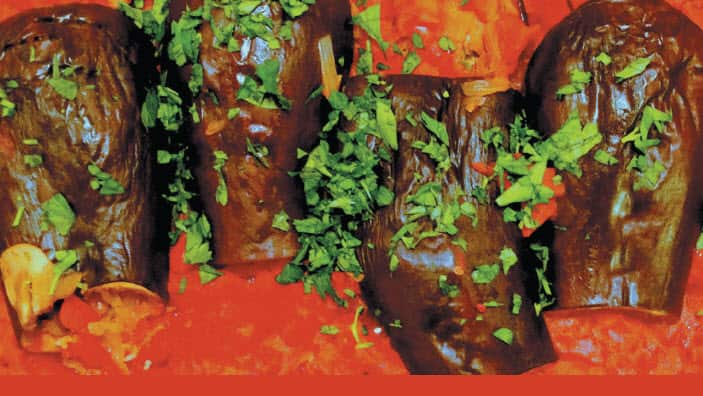
Kurdish deserts, like other Middle Eastern deserts, are mostly baked or fried, and best of all very sweet often soaked in glucose syrup!
Here's Chiman Zebari's recipe for Kurdish Zolobia, a fried yogurt based batter/dough-snail shaped, then soaked in syrup.
Recipe: Zolobia
2 cups corn starch
1/4 cup white or wheat flour
1 cup plain yogurt
2 tablespoons rosewater (you can find it at any middle eastern stores)
canola oil (or any liquid cooking oil)
1/5 teaspoon ground saffron
1 tablespoon butter
1/5 teaspoon baking soda
For syrup:
2 cups sugar
1 1/3 cups water
1/4 cup rosewater (you can find it at any middle eastern stores)
1 1/2 tablespoons lemon juice
1/5 teaspoon ground cardamom
1/5 teaspoon ground saffron
Instructions:
1. Dissolve ground saffron in 1 tablespoon of boiling water and set aside.
2. To make the batter; place the yogurt and corn starch in a mixing bowl. Let sit for 5 minutes. Then mix well. Add the wheat flour, 2 tablespoons rosewater, butter, baking soda and dissolved saffron. Beat with a mixer until the batter is smooth (I used electric mixer). Let it stand for 30 minutes.
3. Meanwhile make the syrup. To make the syrup; combine water, 1/4 cup rosewater and sugar in a small saucepan. Bring to a boil over medium-high heat. Continue heating until sugar is completely dissolved and the syrup thickens, stirring occasionally (avoid too much stirring). Add lemon juice and ground cardamom and saffron and mix well. Remove from heat.
4. Transfer the batter to a medium a funnel instead.
5. In a deep medium skillet, heat the oil over medium-high heat. Then reduce the heat to medium. Carefully squeeze out batter from the zip lock bag into hot oil. Gradually swirl the batter outward in a circular motion, make about 4 inches round. Be careful, the oil may splash! Fry until golden brown on both sides, turning once. Add more oil if necessary. Using tongs or two forks, carefully remove Zolobia from skillet and shake off excess oil. Drop gently into syrup. Let it stand in syrup for 4-5 minutes. Place them in a colander (do not place the Zolobia on top of each other while draining, just a single layer).
6. Then transfer the Zolobia to a serving dish and cool in a single layer. Repeat with remaining batter. Let it cool and serve with hot tea.
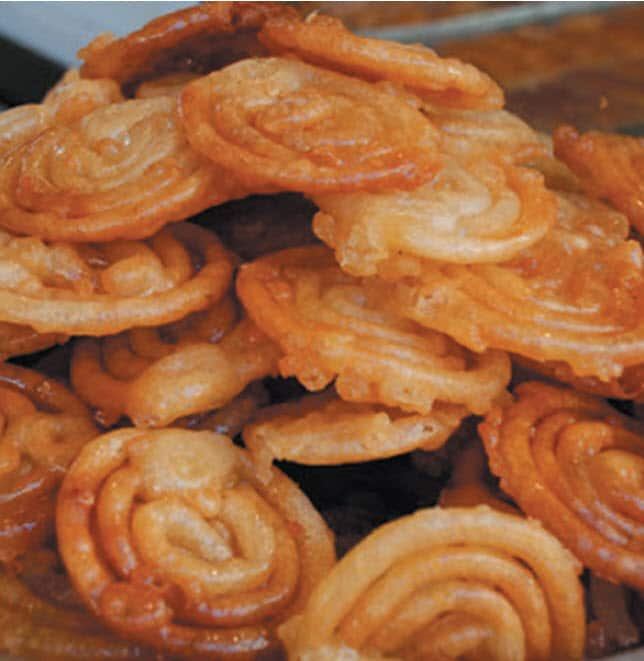
Listen to Chiman Zebari's interview with SBS Kurdish (in Kurdish) below:
